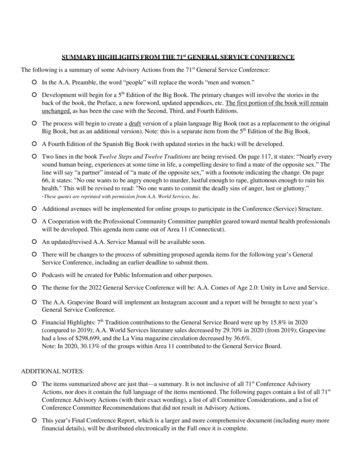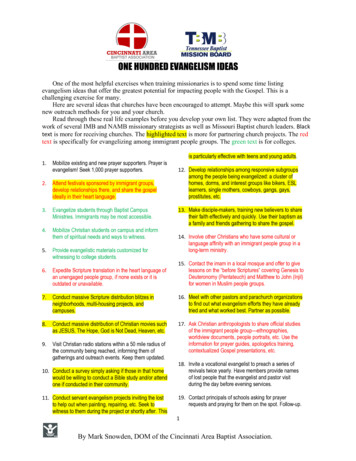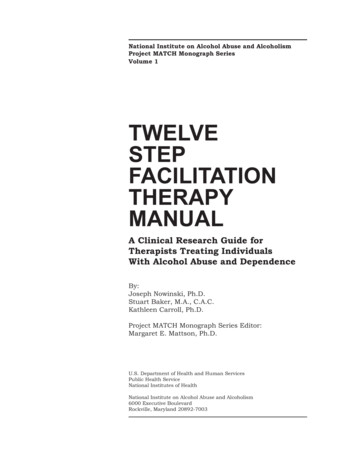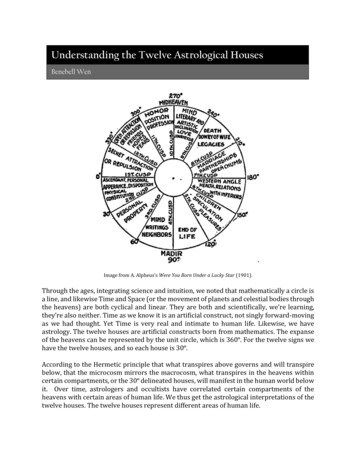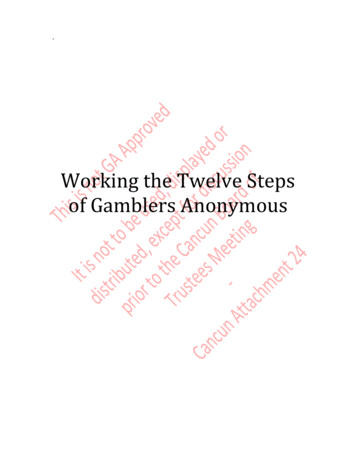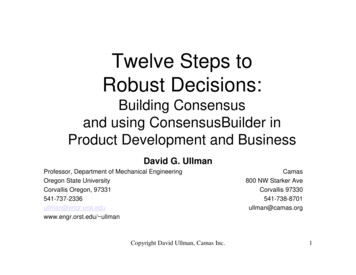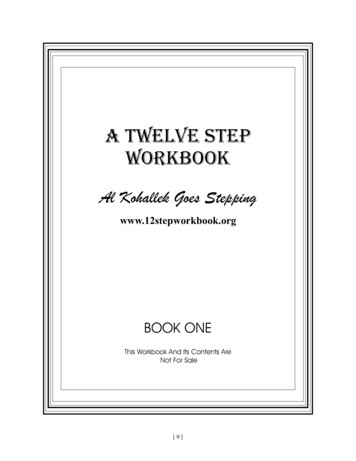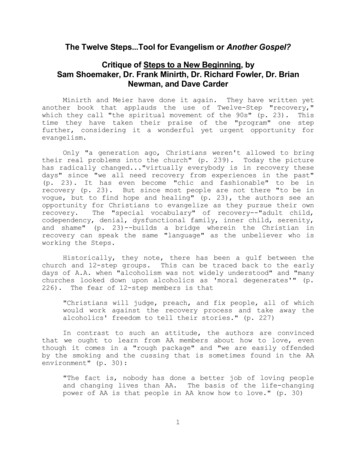
Transcription
The Twelve Steps.Tool for Evangelism or Another Gospel?Critique of Steps to a New Beginning, bySam Shoemaker, Dr. Frank Minirth, Dr. Richard Fowler, Dr. BrianNewman, and Dave CarderMinirth and Meier have done it again. They have written yetanother book that applauds the use of Twelve-Step "recovery,"which they call "the spiritual movement of the 90s" (p. 23). Thistime they have taken their praise of the "program" one stepfurther, considering it a wonderful yet urgent opportunity forevangelism.Only "a generation ago, Christians weren't allowed to bringtheir real problems into the church" (p. 239). Today the picturehas radically changed."virtually everybody is in recovery thesedays" since "we all need recovery from experiences in the past"(p. 23). It has even become "chic and fashionable" to be inrecovery (p. 23). But since most people are not there "to be invogue, but to find hope and healing" (p. 23), the authors see anopportunity for Christians to evangelize as they pursue their ownrecovery.The "special vocabulary" of recovery--"adult child,codependency, denial, dysfunctional family, inner child, serenity,and shame" (p. 23)--builds a bridge wherein the Christian inrecovery can speak the same "language" as the unbeliever who isworking the Steps.Historically, they note, there has been a gulf between thechurch and 12-step groups. This can be traced back to the earlydays of A.A. when "alcoholism was not widely understood" and "manychurches looked down upon alcoholics as 'moral degenerates'" (p.226). The fear of 12-step members is that"Christians will judge, preach, and fix people, all of whichwould work against the recovery process and take away thealcoholics' freedom to tell their stories." (p. 227)In contrast to such an attitude, the authors are convincedthat we ought to learn from AA members about how to love, eventhough it comes in a "rough package" and "we are easily offendedby the smoking and the cussing that is sometimes found in the AAenvironment" (p. 30):"The fact is, nobody has done a better job of loving peopleand changing lives than AA. The basis of the life-changingpower of AA is that people in AA know how to love." (p. 30)1
This is a rather incredible statement in view of AA's general biasagainst Christianity, and the fact that only those who know Christare able to love according to biblical standards. Perhaps changesneed to be made in the church itself and in its members, but thosechanges must come from the teaching of Scripture, not theteachings and practices of unbelievers. (We will return to thatsubject!)Suppose the Christian wishes to evangelize but is not inrecovery himself?Quoting Bob Bartosch of the Christian 12-steporganization Overcomers Outreach, "People in recovery are adifferent breed of cat. If you don't understand recovery from theinside, you don't understand recovery" (p. 173).But thisobstacle is no problem to Minirth/Meier: "The good news is that anonrecovery person can go into recovery" (p. 173).They see auniversal need for recovery."we are all driven, we are alladdicted to something in some degree" (p. 172). Just as chapters1, 2, and 3 of Romans demonstrate the need of all mankind forsalvation, these authors make a similar claim for recovery:"Clearly, the recovery issue is a huge net that draws us allin, despite our protests and denials. Can you honestly sayyou don't see yourself in that list? So.if you are not inrecovery, why aren't you?It's a question only you cananswer." (p. 172)Well, why aren't you? Do you, perhaps, see a discrepancy betweenthe teachings of "recovery" and the teachings of Scripture?Doyou see a difference between the goals of "recovery" thesanctification of the believer?Before exploring the authors'very worthy goal of Christian evangelism, numerous questions mustbe asked to determine whether the Twelve Steps are truly aneffective tool for such evangelism:* Were the founders of AA really Christians?* Are the Steps really rooted in biblical principles?* Are the teachings of unbelievers, found in bothpsychology and the 12 steps, compatible with Scripture?* Are "recovery" groups similar to the early church?* Do these groups supplement, or replace, today's church?* Is Jesus Christ the unnamed "higher power" of the12 steps?* Can a Christian live with the spiritual fuzziness ofthe 12 steps?* Is it helpful to "Christianize" those steps?* What are the dynamics of "recovery" groups, and are2
they operated on principles compatible with the Bible?* What are the qualifications, goals, and motivations ofgroup leaders?* What is the role of the pastor in "recovery" groupsmeeting in his church?* Is 12-step sponsorship a replacement for discipleshipor a helpful addition?Historical Background: Alcoholics AnonymousThe popular 12-step movement has its origins in AlcoholicsAnonymous, founded in the early 1930's by two drunkards, BillWilson and Dr. Bob Smith.They were strongly influenced by SamShoemaker, who wanted to reach people for Christ, and FrankBuchman of the Oxford Group, a movement which stressed the "fourabsolutes" of honesty, purity, unselfishness, and love (p. 16-17).Because of these influences, and a widespread myth that the earlyA.A. founders were Christians, the Twelve Steps are believed to begrounded in Scripture. Note the comments of Sam Shoemaker at the20th anniversary celebration of A.A.:"I believe that A.A. has derived its inspiration and impetusindirectly from the insights and beliefs of the church.Perhaps the time has come for the church to be reawakened andrevitalized by the insights and practices found in A.A.Idon't know any fields of human endeavor in which the TwelveSteps are not applicable and helpful." (p. 20)Actually, A.A.'s sources of early inspiration are not necessarilycompatible at all with biblical Christian faith.A completehistory and analysis is far beyond the scope of this briefwriting, but other writers have done excellent research (TwelveSteps to Destruction, by Martin and Deidre Bobgan; The Useful Lie,by Dr. William Playfair; Alcoholics Anonymous Unmasked, by Dr.Cathy Burns). The supposedly "Christian" origins of A.A. are notbeyond question, as Minirth/Meier so boldly claim.The Oxford Group sought "to reach all spiritually seekingpeople, even people who were antagonistic toward traditionalchurches" (p. 47). This is highly questionable, even though thechurch certainly must seek to proclaim the gospel clearly to allpeople.In their meetings, "members were encouraged to workthrough their own problems by helping others with similarproblems" (p. 47). There is no biblical basis for this practice.The Christian does not help others in an attempt to help himselfwith the same problem; in fact, he must first confront his own3
sin, and then he can see clearly to help the other (Matthew ies,confession, prayer, Bible study, and informal talks" (p. 47).Prayer, Bible study, testimonies, and fellowship are legitimatepurposes for small Christian groups.Open confession, however,may all too often be biblically inappropriate--confessing sinsbefore groups of uninvolved parties to seek relief.The Oxfordgroup was banned from the Princeton campus, and then given supportby the University of Oxford in England, hence its name (p. 46).A.A. eventually broke off from, dropped any and all connectionswith Christianity, and decided that they needed "a program withoutreligious dogma, and which welcome alcoholics of all persuasions-even atheists" (p. 47). A.A. is not a Christian group, and eventhese authors, who are such staunch defenders of the Twelve Steps,admit in numerous places the outright hostility to the gospel thatis found in A.A. meetings. Yet incredibly, they state that:"Since the earliest stirrings of the recovery movement,prayer and Bible study have been viewed as crucial,indispensable elements in the recovery process.AA founderBill W. devoted himself to the spiritual side of the TwelveSteps.He prayed daily, immersed himself in Scripture andChristian literature, and often said that Oswald Chambers'classic devotional My Utmost for His Highest was his favoritebook aside from the Bible." (p. 84)In reality, there is no place in A.A. for Bible study! Even theseauthors, as shown later, look on Scripture in recovery meetingswith contempt. Instead, it is the A.A. "Big Book" that is their"bible," mandatory daily reading for group participants, alongwith other A.A. publications.As for the life and spiritualcondition of Bill W., these authors wrongly claim that he became aChristian:(Discussing several ways in which people find God.) "Thefifth way people find God, said Sam Shoemaker, is through thepersonal witness of others.This is how the cofounder ofAlcoholics Anonymous came to be rescued from his ragingalcoholism." (p. 41)"Once the Holy Spirit shows us that, apart from Christ, weare all down-and-out inside, true redemption can invade ourlives.That is how AA founder Bill Wilson finally came toGod." (p. 43)After describing Bill W.'s exposure to the gospel andanswering an altar call at an Oxford meeting, as well as his4
famous "great white light" experience in a hospital: "Bill'sconversion was the explosive kind, not unlike Paul's dramaticconversion on the road to Damascus." (p. 44-45)Bill W. did have some exposure to the gospel, and he was visitedby a former drinking buddy (Ebby T.) who claimed to have "foundconversion." However, there is no real evidence that he trustedChrist for salvation, only that he came to acknowledge theexistence of a "higher power," the term so widely used in 12-stepgroups.An examination of his life shows no indication of arelationship with Christ, but rather the opposite. Again, I referthe reader to the other authors mentioned for more detailedinformation on A.A. history, as well as to A.A. literature itself.Bill W.'s spiritual condition is vitally important, especiallywhen we consider the fundamental question of whether the "wisdom"of the ungodly can provide counsel for the Christian in overcomingsinful habits. Bill W. was not a Christian, but an unbeliever.Are the Twelve Steps Really Rooted in Biblical Principles?The authors make startling claims about the biblical roots ofthe Twelve Steps, which they consider "a pattern for spiritualcommitment, growth, and discipleship that every Christian canpractice every day of the year" (p. 15).In their claims theyexalt psychology so as to put it on the level of Scripture, theyshow contempt for sound doctrine, they demonstrate a shallowunderstanding of sanctification, and they making confusingcomparisons between Twelve Steps groups and the church.Are psychology and the Bible compatible?This question isbasic to all that follows.The Christian community in Americantoday has warmly embraced the practice of psychotherapy.Eitherunaware of that alliance, or grossly underestimating it, theauthors claim that "in American Christianity, there are manypeople who mistakenly believe that psychology and the Bible do notmix" (p. 221).The unfortunate multiplication of "Christian"psychology books attests to the contrary! Nevertheless, MinirthMeier claim:"In recent years, a spate of Christian books has condemnedthe Twelve Steps, the recovery movement, and the entire fieldof psychology, whether secular or Christian." (p. 221)A quick stroll through almost any Christian bookstore provesotherwise! There ought to be many more such books to counter theappalling lack of discernment among Christians today. There are a5
few books daring to question psychology, most of them almostimpossible to locate.Only occasionally is such a controversialbook able to obtain a public hearing.The authors mention a"recent best-seller" written by a pastor who (supposedly)"expresses little empathy for the very real problems manyChristians face." Despite their quote of this author, and theirnegative evaluation, they fail to name their source! This is poorscholarship. If they are so sure of their position, why do theyfail to name their sources so that people can read and decide forthemselves? They also fail to note that there are some excellentbooks and other materials which help people to address theirproblems biblically, without the use of psychology. Jay Adams isthe author of numerous excellent, detailed books with answers fromGod's Word to the "real problem Christians face," to use MinirthMeier's term.The Biblical Counseling Foundation has prepared awonderful Self-Confrontation Manual to guide Christians step bystep in common everyday life problems.Other authors arebeginning to join in, and organizations such as the NationalAssociation for Nouthetic Counselors, provide biblically-basedtraining for pastors and other believers to counsel one anothereffectively.Meanwhile, Minirth-Meier simply do not state the issueseither accurately or completely.Following are quotes of theirsignificant statements on the matter, and a response from theopposing position, which states that God's Word is perfectlysufficient, without psychology, to help believers face all of theproblems of life."Much of the hostility many Christians feel toward psychologycomes from a misunderstanding of both psychology and the Wordof God. The truth is that there is a lot of psychology inthe Bible.The Psalms, Proverbs, the teachings of Christ,and the New Testament epistles are filled with insight intothe workings of the human mind, human emotions, and humanrelationships." (p. 221)Here they have stated the focus of the opposing viewpoint!Indeed, the Bible contains the very insights they note about themind, emotions, and relationships of man.It exposes thefundamental nature of man. And it gives clear, direct answers tothese issues. But psychology addresses the same issues! Far frombeing an unrelated field untouched by the Bible, it is in directcompetition with God's Word! And considering the confusing arrayof conflicting answers offered by the unregenerate minds of thosewho invented the va
Sam Shoemaker, Dr. Frank Minirth, Dr. Richard Fowler, Dr. Brian Newman, and Dave Carder Minirth and Meier have done it again. They have written yet another book that applauds the use of Twelve-Step "recovery," which they call "the spiritual movement of the 90s" (p. 23). This time they have taken their praise of the "program" one step further, considering it a wonderful yet urgent opportunity .

